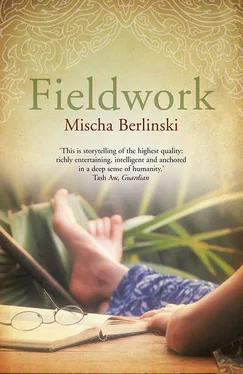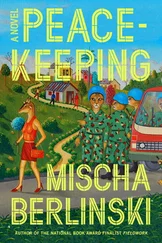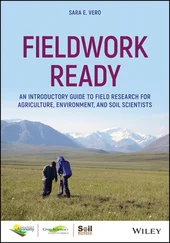"We planted rice by moonlight. I followed him. He walked in front of me. Hupasha would step forward and rear back and pound the dibble stick into the earth, drive the thing a foot or two feet deep into the earth, and I would breathe in and step forward. We had a rhythm, the two of us, and my part was so delicate and simple, just to take the seed and let it drop; then we'd step forward.
"Then he reached for me. And I saw Rice. Either you know Rice or you don't. Rice is like steam rising from the fields, like silver flames. I didn't know where I ended, where he began. The field was on fire with Rice. His touch, his smell — where does such a good thing come from? I had never before understood what the Dyalo meant when they said, ‘Only a woman can make rice.' Later they would tell me, ‘Stop making dyal . Walk away from dyal .' I couldn't.
"I made dyal , and I got home to the village and all I thought about was dyal . And it's not true that you can only make dyal once a year, at planting time. Rice is always there. I used to ask, ‘What happens if you see your gin-kai when it's not the dyal ?' ‘But, Martiya, that is not our custom.' ‘But if a woman sees her gin-kai , what would happen?' ‘Martiya, she would be a slave to Rice.' I never thought to ask why that would be a bad thing.
"That is the dyal , and how could Hupasha want to leave it all behind him? How could he? I'll never understand that, not until the day I die. What is better than Rice?
"I had so much still to learn about Rice. I had just begun to understand Rice, when Hupasha left.
"I must have spent weeks, then months like that. At night I dreamed of being with Hupasha. Of Rice. I'd wake up sweating. Then I'd fall back asleep and have the same dreams all over again."
"One day David Walker came by my hut. It was toward sundown when he knocked on the door. I saw him through my window. He knocked again, and when I didn't answer, he pushed the door open. He stood in the threshold.
"He was large, much larger than I was — and as he stood in the doorway of the hut, with the sun setting right behind him, the hairs on his arms were very fine and golden. I remember looking at those hairs, and thinking no wonder the Dyalo were so impressed by him, he looks like a tiger to them. Once I went out hunting with Fat Belly, years and years ago. We went deep in the jungle and I saw a tiger. It couldn't have been much farther away than that wall. They say that there are no more tigers in northern Thailand, but I saw one. And when you see a tiger in the jungle — you don't see anything else. That's what I thought about when I saw David.
"David didn't say anything for a moment. Then he said that Hupasha had asked him to come. I asked him why, and David said that he needed to talk to me. I said, ‘Talk,' but he asked if he could come in.
"He was so big, and there wasn't quite enough space in the hut for both of us. We were both sweating because it was such a hot night. His teeth were very white, and I could see the pores in his skin. I could feel the heat coming off him. I was a little frightened of him, to tell you the truth. I asked him the last time he saw Hupasha, and he said that he had seen him just the night before. He had been up there talking about the Bible with him. And I said, ‘David, will you tell me something?'
"David nodded yes, and I asked him if Hupasha was really a Christian. Or whether it was just something that Hupasha invented to get rid of me. That's what I really wanted to know.
"David thought for a long time. He said, ‘It was hard, what he had to do. Choosing for the Lord was the hardest thing he ever had to do. I think he wants to be a Christian — and I think that's enough. God put the desire there.' I thought about that a minute, and I said, ‘Does he want me back?' and David said, ‘Martiya, all I know is that he never, ever wants to go back to Rice.'
"‘But he loved Rice!' That's what I said. I said, ‘David, you have no idea how happy we were together. It was the most beautiful thing in the world, when we were together and made rice. I think we would have been together forever, if you hadn't come along.'
"David leaned forward. I could smell him. He smelled like earth and clay. He said, ‘Martiya, I need to tell you something. I talked to him yesterday. He wants to go back to Burma and tell them about the Lord.'
"I felt like a candle was melting inside me. But I still didn't cry. ‘Was this your idea?' I said. David looked at the ground, and he said, ‘He asked me what I thought about it, and I said that everyone needs to know the Lord.'
"‘But how is he going to eat? Where will he get rice?' I said, and David told me that the Christians had made a rice fund for the evangelists.
"That's when I knew I had really lost him. If Hupasha had decided to go, I knew he would go. I was all alone with Rice. David said, ‘I admire you, Martiya. You've been living here alone for such a long time. I know how hard it is to live without the Lord.'
"But I don't think David realized how angry I was. I said, ‘Why did you do this to me? What did I do to you?'
"David stood up. He looked at me for a long, long time. Then he said, ‘Martiya, will you sing with me?' And he seemed almost as surprised saying these words as I was hearing them, like the words had come out of his mouth by accident. It was the hot season, and we were both so sweaty, his face was red and slick, and my clothes were so heavy. He stretched his arms out wide and leaned over me. Then he began to sing:
‘There were ninety-and-nine that safely lay
In the Shelter of the fold.
But one was out on the hills far away,
Far off from the gates of gold.
Away on the mountains wild and bare,
Away from the tender Shepherd's care,
Away from the tender Shepherd's care.'
"He took my hands. He held them tight and pressed them up against his shirt. I could feel his heart beating. He was out of breath, and I could see veins throbbing in his neck. ‘Did you hear them?' he said. And I said yes, I had heard them, too. Then he walked out the door, leaving it wide open behind him.
"I couldn't believe I would never see Hupasha again. I thought he would come by the next day or the day after that."
"I watched the village prepare that year for the dyal . It was obvious to me that the Christians regretted their decision, and were very jealous now of the animist half. They made Fat Belly the pastor of the church — Fat Belly! In charge of anyone's spiritual life! I think that really says it all. The animist half, though, were very serene. They had lived in these hills forever. Their faces said: This is our life, this is the way Dyalo live; we don't need Ye-su-tsi. We know how to please Rice.
"It had to be the same in Wild Pig village. So when I saw the preparations, I was sure that Hupasha was going to come. And so I started to prepare for the dyal myself. I wanted to look beautiful.
"When I learned about the dyal , the people always used the phrase ‘The dyal is the Lesson of Ten Thousand Harvests.' Can you imagine? They were making dyal long before Jesus was born — maybe not the Dyalo exactly, maybe not the dyal exactly, but somebody was making some ritual like this, to please Rice. Rice is old, older than you can imagine.
"But Hupasha didn't come.
"I got in my jeep and I drove down to Chiang Mai. It's a long drive, but I remember a feeling that if I didn't get out of the hills, get out now … I decided to go for a drink. I went to one of those bars on the river, with the music. I was so grateful to be with strangers, with people who had never heard of the dyal , of the Dyalo even. I ordered a drink, and then another. One of the tourists asked if I wanted to get stoned, and I did. We stood outside on that balcony smoking, looking out over the river, with the reflection of the moon. I started to think, just for a moment, that I was going to be all right, that things were going to work out.
Читать дальше












